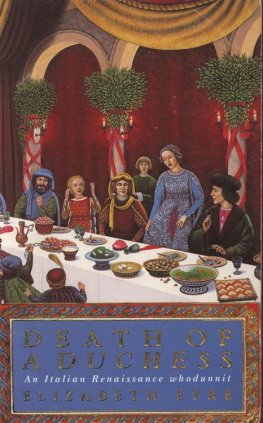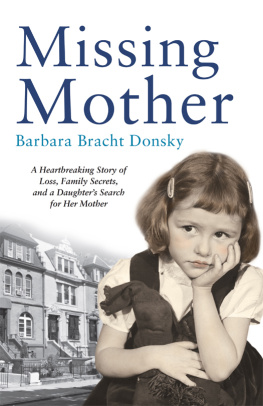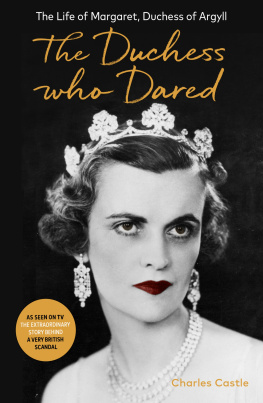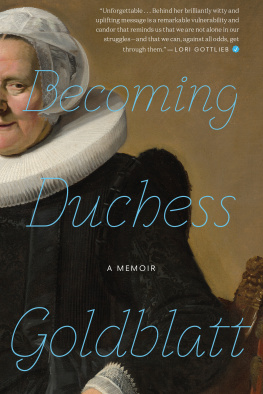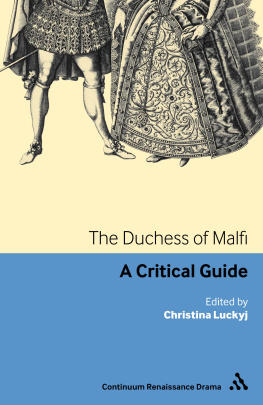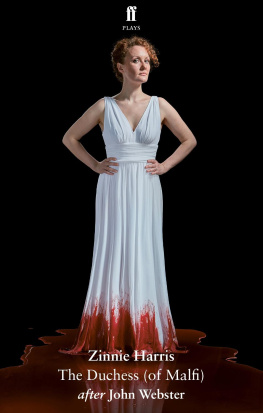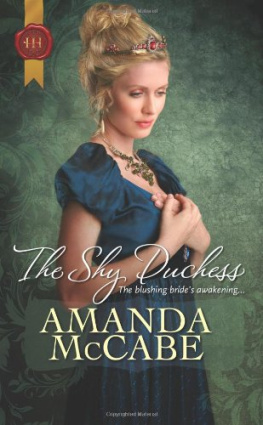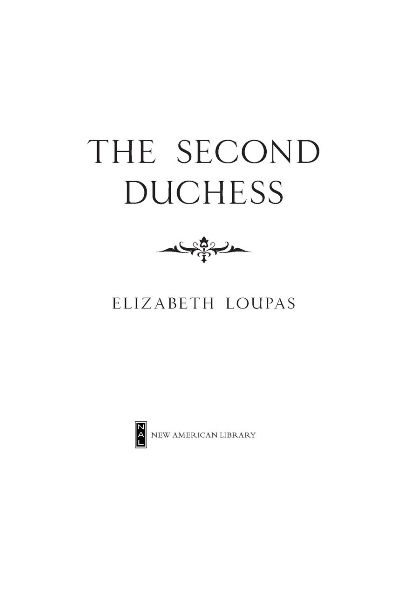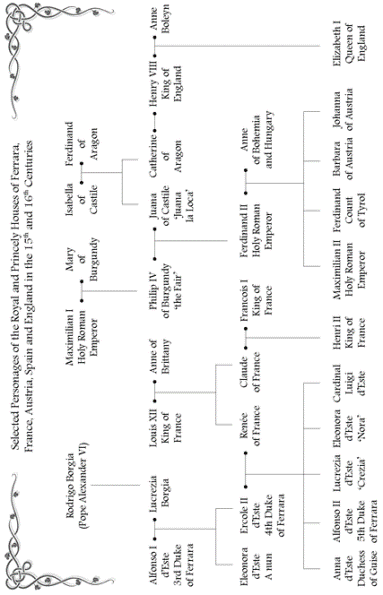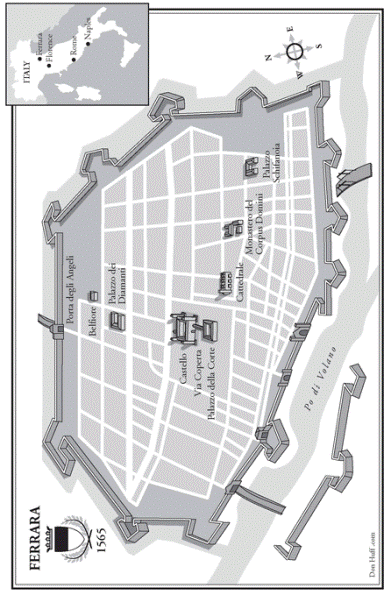Table of Contents
Praise for The Second Duchess
Utterly mesmerizing, captivating from the first page. Thick with shadowy court intrigues and lush period detail, The Second Duchess is a Renaissance masterpiece come to life.
Deanna Raybourn, author of Dark Road to Darjeerling
Robert Brownings classic poem My Last Duchess provides the starting point for Loupass winning debut set in Renaissance Italy.... Readers will warm immediately to the clever, intelligent Barbara, while the demanding, sometimes brutal Alfonso makes an intriguing man of mystery.
Publishers Weekly
I have rarely read a historical novel or mystery that I as fully, gladly inhabited as I did The Second Duchess. I felt actual regret as I neared its end because I did not want to part company with Elizabeth Loupass complex, engaging, intriguing characters. With their world created in deep, believable detail around them, they were true to their time and place, thereby taking me well out of mine, which is the ideal (and all too rare) accomplishment of any work of historical fiction.
Margaret Frazer, author of the Dame Frevisse Mystery series and the Joliffe Mystery series
Rich in historical detail and all the dangerous grandeur of court life in Renaissance Italy. Think The Other Boleyn Girl meets Rebecca.
C. S. Harris, author of the Sebastian St. Cyr Mystery series
Both a fascinating literary mystery and a rich historical novel, The Second Duchess is a feast of vibrant characters and a lush setting. Elizabeth Loupas has opened for us a lost world of ducal power and decadence, and yet made her resilient Renaissance heroine one that a modern woman can admire and root for. Bravo!
Karen Harper, author of Mistress Shakespeare and The Irish Princess
The historical mystery at the heart of this excellent novel kept me turning pages late into the night even as I admonished myself to slow down and savor the feast for the senses laid out on each page. The historical details and warring political factions of Renaissance Italy were convincingly and elegantly delivered, the story compelling, and the voice utterly intriguing. Hard to believe such a finely crafted tale is the work of a debut novelist.
Brenda Rickman Vantrease, author of The Illuminator and The Heretics Wife
Ive always loved Robert Brownings poem My Last Duchess, and the way Loupas springboards from that is a delight. I can hear the voice of Brownings duke in her Alfonso, and the way she departs from it into a nice little mystery is very satisfying. The clothes, the manners, the food and decorations! She creates such a vivid sense of the magnificence of an Italian Renaissance court with her tissues of silver and braids of emeralds, silk stomachers and damascene daggers, candied angelica and rice pudding rolled in cinnamon; festivals, hunts, and balls all the more splendid because of the poisons and thumbscrews and murder going on underneath. Alfonso is fascinating... but Barbara is the jewel here. Her courage and candor seduce the reader as well as her enigmatic new husband. Applause for Elizabeth Loupas. I loved it.
Cecelia Holland, author of The Secret Eleanor
For Jim
CHAPTER ONE
FERRARA
5 December 1565
He murdered his first duchess with his own hands, they say, the Ferrarese hairdressing-woman whispered as she braided a string of pearls into my hair. She was so young, so beautiful.
And I, Barbara of Austria, neither young nor beautiful, would be the dukes second duchess before the pale December sun set. What did the woman expect me to do, shriek and fall down in a faint? Jump up and swear I would not marry the Duke of Ferrara after all, but return straightaway to Innsbruck with my household and dowry and bride-goods down to the last box of silver pins? For all practical purposes I was married already, the contracts signed, the marriage-by-proxy performed. And truth be told, half-a-hundred people had already told me Alfonso dEste had murdered his first wife.
I looked at my reflection in a hand glass. One loop of the pearls remained unfastened. You forget yourself, parruchiera, I said.
The woman stepped back, a pointed braiding-bodkin gleaming in her hand, and for one incredulous moment I thought she meant to stab me with it. Do you think you will be safe here, Principessa, when she was not? The court of Ferrara is like a love-apple, beautiful and rosy-red and alluring to the senses, but poisonous, so poisonous
I put the glass down hard. Enough. You are dismissed.
The very pearls in your hair might be poisoned, she whispered, sibilant as a serpent. That posset you have been drinking. Any piece of fruit, any flower you are offered. Your gloves. A flask of perfume. There are a thousand ways to envenom
Enough. Madonna Lucrezia, ask the gentlemen-ushers to step onto the barge for a moment, if you please, and take this woman away.
The dukes elder sister raised her hand to the men waiting on the quay; her face was turned away from me and I could not see her expression. The men obeyed her gesture smartly and a scuffle ensued; there were a few cries of surprise and excitement from the ladies crowding the barge, and then the parruchiera was gone. My Austrian ladies, my lifelong friends, closed in around me. Lucrezia and Leonora dEste whispered to each other behind their hands, their eyes glinting with things they knew and I did not. They had assembled my Ferrarese household, or so they told me, at the dukes command. Holy Virginhad they deliberately chosen a madwoman to arrange my hair, so as to spoil my pleasure in my entrance into their city?
I picked up the glass. Fortunately, it was not broken. I could see them behind me, watching me, waiting to see what I would do.
Sybille. I spoke to one of my own women with deliberate steadiness. These pearls are too tightly braided. Would you loosen them, please?
Sybille von Wittelsbach stepped forward at once. I watched in the glass and felt some of my distress evaporate as the arrangement of the pearls became less severe. Sybille often brushed and dressed my hair at home; her light, familiar touch calmed me further.
I warned you, Brbel, she said under her breath. No foreigner can arrange your hair better than I. Did they think I meant to steal the pearls?
Of course not. It was the dukes wish for me to be dressed entirely by Ferrarese women before I entered the city. A symbol, nothing more.
A fine symbol. I thought she meant to stab you with that bodkin.
As had I, although of course I did not say so. I closed my eyes, breathed deeply, and willed myself to be still. The magnificent ducal barge shifted and creaked beneath me, rocking gently on the waters of the Po di Volano. I could hear the rustle of a cold morning breeze in the imperial standard flying over me, and the faraway cries of cormorants and herons. I could smell the ancient riverscent, weeds and marshes and fish, and the milky sharp-sweet tang of the hot wine posset on the table in front of me.


